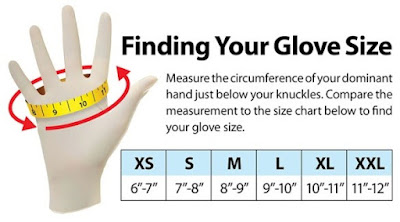Nitrile vs Vinyl Gloves - A Detailed Comparison
In recent times, the use of gloves has become increasingly important in various industries, particularly in healthcare, food service, and laboratory settings. With the COVID-19 pandemic, the demand for gloves has surged dramatically, resulting in a wide range of options in terms of material, size, and thickness. Two common materials used for gloves are nitrile and vinyl. In this blog post, we'll discuss the differences between nitrile and vinyl gloves to help you choose the best option for your needs.What are Nitrile Gloves?
Nitrile gloves are made of synthetic rubber and are widely used in the healthcare industry. They are known for their excellent resistance to chemicals, oils, and solvents, making them a great option for handling hazardous materials. Nitrile gloves are also durable, puncture-resistant, and provide excellent tactile sensitivity. They are available in various thicknesses, including heavy-duty options that are perfect for high-risk situations.What are Vinyl Gloves?
Vinyl gloves are made of a synthetic plastic material called polyvinyl chloride (PVC). They are less expensive than nitrile gloves and are commonly used in the food service industry. Vinyl gloves are best suited for light-duty tasks that do not involve exposure to hazardous materials. They are also less puncture-resistant than nitrile gloves, so they are not recommended for use in high-risk situations.Material and Composition: Nitrile gloves are made from synthetic rubber while vinyl gloves are made from PVC.
Strength and Durability: Nitrile gloves are more durable and puncture-resistant than vinyl gloves. They can withstand exposure to chemicals, oils, and solvents. On the other hand, vinyl gloves are less durable and more prone to tearing or puncturing.
Comfort and Fit: Nitrile gloves are soft and comfortable to wear. They provide excellent tactile sensitivity, making it easy to perform tasks that require precision. Vinyl gloves are less soft and may cause skin irritation or allergic reactions in some people. They also have a looser fit than nitrile gloves, which may make it difficult to perform tasks that require precision.
Price: Vinyl gloves are less expensive than nitrile gloves, making them a popular option for those on a tight budget. However, the price of nitrile gloves has come down in recent times, making them more affordable than they used to be.
Applications: Nitrile gloves are commonly used in the healthcare industry, particularly in hospitals and clinics. They are also used in laboratory settings, the food processing industry, and other high-risk environments. Vinyl gloves are used in light-duty tasks, such as food handling, janitorial work, and hairdressing.
Nitrile & Vinyl Exam Gloves Below
On Sale Today!
 Vinyl Gloves On Sale 1,000 Per Case 4 Mil Strength, Powder Free  Nitrile Gloves On Sale 1,000 Per Case 3.5 Mil Strength, Powder Free  Black Vinyl Gloves On Sale 1,000 Per Case 4 Mil Strength, Powder Free Black Nitrile Gloves On Sale 1,000 Per Case 6 Mil Strength, Powder Free |
Free Glove Samples
Select from Latex, Nitrile or Vinyl
We will ship you free samples of Latex, Nitrile, or Vinyl gloves. Choose the glove type and options that best fit your needs:
- Choose from Powdered or Powder-Free
- Easy Slip-On, Beaded Cuff
- Allergy Free / Latex Free
- (4 Mil) Strength thru (14 Mil) Strength
- 4 Pairs of Gloves (8 Total) Per Sample Order
- (Standard) 9" inch Exam Glove with Beaded Cuff
- Available Sizes: Ex-Small thru Ex-Large
Free Samples Available:
Order premium quality samples of Latex, Nitrile, Vinyl, and Food Handling Gloves marketed to medical, dental, industrial, laboratory, food & other industries are FDA Approved / OSHA approved. High-quality samples of "industrial" or "exam" medical-grade gloves that have gone through stringent inspection based on ISO Certification. Additional shipping fees will apply.












